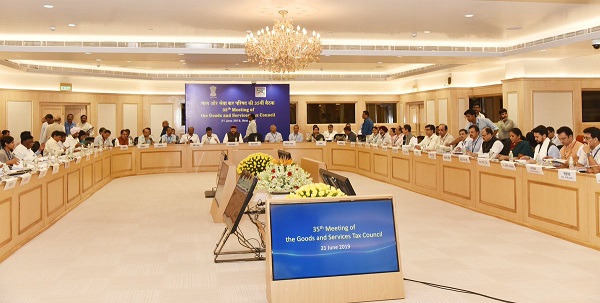The most awaited 35th GST council meeting was held on 21st June 2019 at New Delhi. It was the first meeting of the Council after the swearing in of the new Government.
Following are some of the key recommendations made therein:
1. It has been decided to have a common State Bench for the States of Sikkim, Nagaland, Manipur and Arunachal Pradesh
2. Decision related to extension of various near approaching due dates:
i. GSTR-9 / GSTR-9A & GSTR-9C, for F.Y. 2017-18– extended till 31st August 2019
ii. Form GST ITC-04 for period July 2017 to June 2019- extended till 31st August 2019
iii. CMP-02: Form for composition scheme by Service providers- extended till 31st July 2019
3. The Council also decided to introduce electronic invoicing system in a phase-wise manner for B2B transactions. E-invoicing is a rapidly expanding technology which would help taxpayers in backward integration and automation of tax relevant processes. It would also help tax authorities in combating the menace of tax evasion. The Phase 1 is proposed to be voluntary and it shall be rolled out from Jan 2020.

4. E-way bill related:
Rule 138E of the CGST rules, pertaining to blocking of e-way bills on non-filing of returns for two consecutive tax periods, to be brought into effect from 21st August 2019, instead of the earlier notified date of 21st June 2019.
5. Regarding New Return system
a. Trial Basis: Form GST ANX-I and Form GST ANX-2 will be available on trial basis to taxpayers between July 2019 to September 2019.
b. Small taxpayers (those having turnover of upto Rs. 5 Crores in previous financial year)
i. Form GST ANX-1: to be filed quarterly for period October 2019 to December 2019 in January 2019.
ii. Form GST RET-01: quarterly for period October 2019 to December 2019 in January 2019.
iii. Form GST PMT-08: from October 2019
iv. Form GSTR-3B: not to be filed from October 2019
c. Large taxpayers (those having turnover of more than Rs. 5 Crores in previous financial year)
i. Form GST ANX-1: Compulsory filing from October 2019
ii. Form GSTR-3B: To be filed for October 2019 & November 2019
iii. Form GST RET-01: To be filed from December 2019
d. Note:
i. Invoices etc. can be uploaded in FORM GST ANX-1 on a continuous basis both by large and small taxpayers from October 2019 onwards. FORM GST ANX-2 may be viewed simultaneously during this period but no action shall be allowed on such FORM GST ANX-2
ii. From January, 2020 onwards, FORM GSTR-3B to be completely phased out
6. Other decisions:
1. Tenure of National Anti-Profiteering Authority (NAA) has been extended by 2 years
2. Aadhaar based GST registration to be introduced
Note: These are just the recommendation of GST Council, however the same shall came into effect only on issuance of relevant notifications in regards of the same.





21/06/2019 MEETING NOTIFICATION NO . WHERE SEE
A PICK:
“6. Other decisions:
1. Tenure of National Anti-Profiteering Authority (NAA) has been extended by 2 years”
One has to await the formal Notification, for DEATILS.
Be that as it may, thought that the tenure would require to be extended with no time limit – that is, so long as the GST Code / Rules continue to be in force, and the scope /possibility of excess / undue ‘profiteering’ by ‘supplier’ cannot be wished away/ruled out. For that matter, lodging of complaint against an offender could happen even on the last day to which the tenure is extended. That means the need for the Authority to be in place will not cease but will continue even after any such last date as proposed and fixed.
OVER to tax pundits, within and without the Official Portals for a view forward !
Instantly comes to mind the sections in CHAPTER XXC of the IT Act. Sec 269UP therein, declares that Chapter is not to apply where transfer of immovable property is effected after the specified date of 01-07-2002. Should, however, that be strictly/rigidly construed, then quite many of the other related provisions in the Act- for instance those governing taxation of income under the head of ‘house property’ or ‘capital gains’ would, it appears, have been rendered impossible thereafter.
That is a not-so-obvious angle likely to be missed; for helpful clues, suggest to go through the published Article –
https://taxguru.in/…/law-and-vs-case-law-on-flats-a-critica…
Any contrarian / counter-view?!